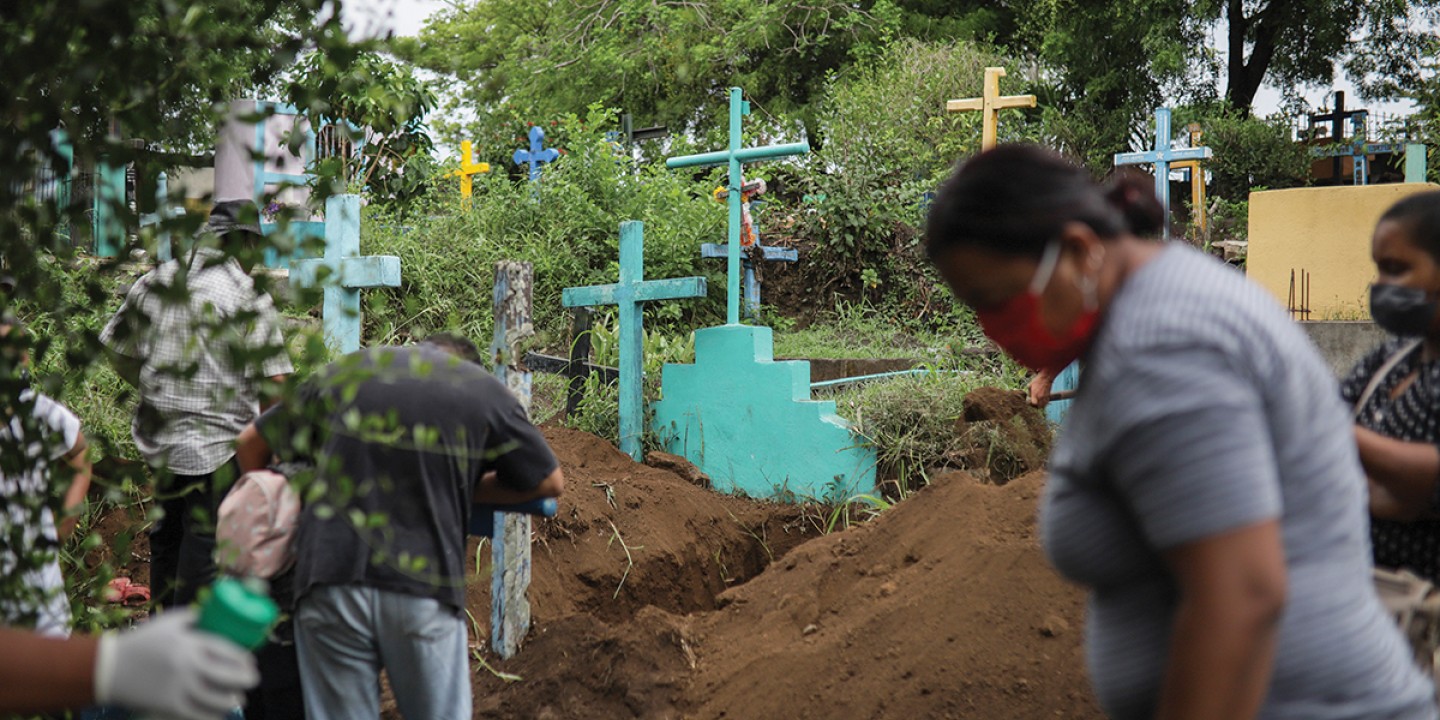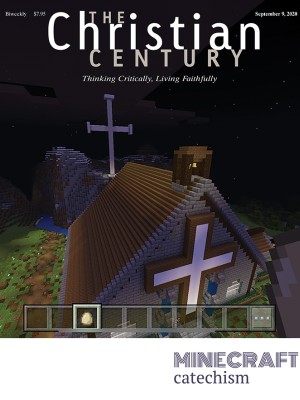Government denial is raising the stakes of COVID-19 in Nicaragua
Amid a disinformation campaign, churches are trying to provide education and aid.

For the past two years, ever since the 2018 conflict over government pension policy and the subsequent crackdown, Nicaraguans have suffered political oppression. For the past four months, they have also been struggling with a marked difference between the government’s story about COVID-19 and the reality they see in their communities.
Inaccurate reporting of numbers of COVID-19 cases and deaths have become the norm. So have government promotion of social gatherings, not social distancing, and reports of “express burials” carried out under cover of night.
“The government’s behavior is not rational,” said Leonel Argüello, an epidemiologist who cofounded Nicaragua’s Ministry of Health in the 1980s. Last March, he joined with a group of Nicaragua’s leading physicians and scientists to form the Multidisciplinary Scientific Committee, which aims to alert the public about the danger of COVID-19 and to educate them on care and prevention.
Read our latest issue or browse back issues.
“We are doing what we can to get accurate information out and to reach people through NGOs, but it is hard when the government controls most of the official media,” Argüello said. “Journalists have moved online to Instagram, YouTube, and Facebook. We’re making our best effort, but our reach is small. Without government leadership I don’t think it will be enough.”
Along with the Multidisciplinary Scientific Committee, Christian organizations have been seeking to communicate the World Health Organization’s guidelines and get the truth out.
“The Catholic Church was the first institution to tell people to be careful,” said a diocesan priest from the city of Granada, speaking anonymously for fear of government reprisal.
“The Church has put Mass on social media and television. Catholic schools have moved their teaching online, and people are listening to the bishops, who repeat the World Health Organization’s guidelines,” he added. “We are accompanying the sick, trying to distribute personal [protective] equipment and food among the poor, as well as keeping in touch with our parishioners by phone. But the government keeps promoting normality and mass activities. Some people have stayed home because the church has been urging them to be cautious.”
Evangelical churches are also striving to support their members and their communities. César Augusto Marenco heads the 30,000-strong Ministerio Apostolar Centro Cristiano in Managua. The church has not held in-person services in two months, although Marenco is eager to reopen. He acknowledges that some evangelical churches have already done so and that some pastors have died.
“This is not the government’s opinion, but my personal one: I believe we should allow people to be infected and strive for herd immunity,” he said. “The psychological effects of fear and isolation are also a problem. I am concerned by the ways some of our church members are terrified to go to any in-person meeting at all. I believe that the psychological damage caused by fear is just as bad as the virus itself.”
While in-person worship remains on hold, Marenco has been using his church structure to distribute PPE and other provisions.
“We’re a large church structured like a big family, with 2,500 small family groups around Managua,” he said. “We’ve seen real solidarity, with community members helping one another. Those who have financial resources are coming forward to help those who don’t.”
So far, the government hasn’t interfered with Marenco’s work, but that has not been true for some of his Catholic counterparts.
Last March Bishop Rolando José Álvarez Lagos of Matagalpa started a project aimed at educating people about COVID-19 and setting up a clinic. The government stopped him almost immediately after he started.
“We are living under a dictatorship,” said a Catholic monk who, fearing government retaliation, asked to remain anonymous. “Being part of the church is hard in that we can’t do a lot. I know a nun who, when the pandemic started here in March, was accused of being a dissident for wearing a mask. The pandemic is completely politicized.”
For those who remember the Sandinista Revolution of 1979, Nicaraguan president Daniel Ortega’s transformation from a revolutionary into an enforcer of the status quo is very disappointing.
“This government is a prisoner of its mottos . . . one of which is el buen gobierno, good government,” said a retired history professor who also asked to remain anonymous. “They pride themselves on building roads, extending electricity, entertaining people, building houses for poor people. But when an event takes place that calls into question or contradicts their idea of el buen gobierno, the rulers react by minimizing or ignoring the disturbing reality.”
This professor notes similarities between Ortega, Jair Bolsonaro in Brazil, and Donald Trump in the US.
“Despite their different ideologies, they share a concern for the economy, which has been put above ideology in their cases,” he says. “‘Mr. Money is a powerful gentleman,’ said the great Spanish poet Francisco de Quevedo.”
“I believe this government’s main motive is to maintain power,” said the diocesan priest, adding that even though Nicaraguan cardinal Obando y Bravo, who is now deceased, formed an apparent alliance with Ortega’s government when he was first elected in 2006, most of the Catholic Church is not in favor of the government today—particularly since the pension crisis of 2018.
“The church has no political interest,” the priest said. “We are doing what we can to try to help people in need. It is our mission to accompany people, even dying with them if need be, but it is difficult to deal with a government that does not have the people’s interests at heart. They say there have only been 100 deaths; we know the real numbers are much higher.”
The diocesan priest also expressed frustration that the government uses religious rhetoric to maintain power and influence.
“During her daily television address, Ortega’s wife and vice president, Rosario Murillo, quotes scripture and invokes saints, though also drawing on occult and spiritualist language,” he said. “But I see it as a form of manipulation. She knows that the church holds weight here, and she wants to appear religious. But why, then, is she announcing festivals and dances? Why is she urging people to attend public events?”
Like the Multidisciplinary Scientific Committee, the Catholic Church is limited in the help it can provide because it also struggles with poverty and vulnerability. Nicaragua shoulders the burden of being the second-poorest country in the Western Hemisphere.
“A lot of priests here live only on their Sunday collections,” said the monk. “Without that, and with rising prices due to the economic crisis, what are they to do?”
He would like to see more support from Christians in the US. “We are living in poverty without capital. I’d like to see microloans given out in parishes, because hunger is a worsening problem. In terms of health, sending personal protective equipment would be wonderful, but I have no idea if the government would let it in. We need world support against what has been a repressive, dictatorial regime since April 2018. Also, the church in the US and other powerful countries can help by making sure Nicaraguans get access to a vaccine once it becomes available. Often countries in poverty are the last to get the vaccine.”
The diocesan priest is pessimistic that the government would allow any donation of PPE to reach those who need it most. But he asks for solidarity in prayer.
“The global Church is united in prayer. It is our strength. I hope US Christians will keep the Nicaraguan Church in [their prayers]. We have suffered poverty, war, and totalitarianism as well as this pandemic. Please remain with us in prayer through this.”
A version of this article appears in the print edition under the title “Disinformation in Nicaragua.” The online version was edited on August 25, 2020.





